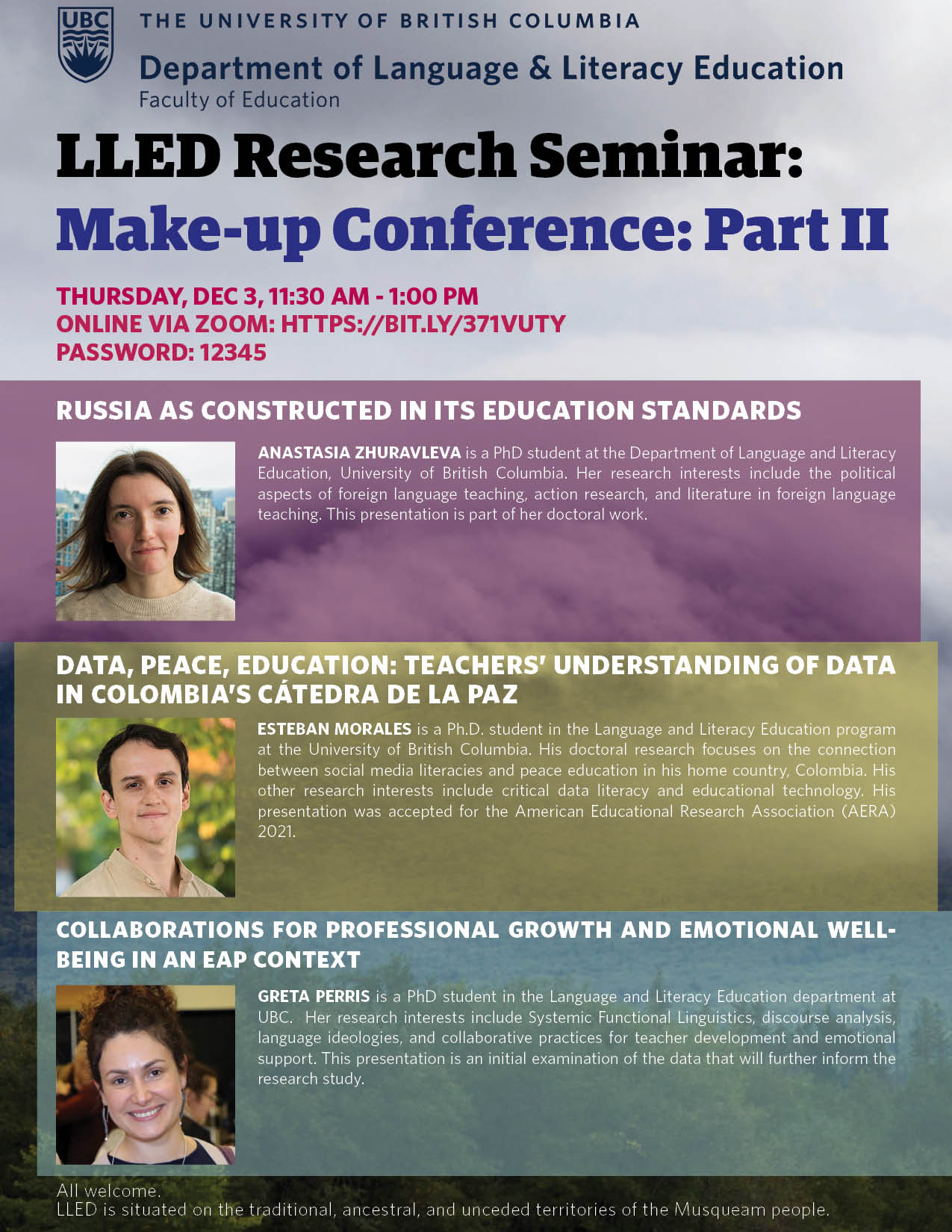Venue: Online via Zoom
Presenters Anastasia Zhuravleva, Esteban Morales, Greta Perris
Zoom Link: ubc.zoom.us/j/68393302856?pwd=MzJwSmZhUDJhbVVQY1RLMDJoNGRtZz09
Password: 12345
Make-up Conference – Part II Schedule
| 11:30-11:35 |
Introduction + Land acknowledgement |
5 minutes |
|
11:35-11:45 11:45-12:00 |
Presentation 1 (Anastasia Zhuravleva) Discussion |
10 minutes 15 minutes |
|
12:00-12:10 12:10-12:25 |
Presentation 2 (Esteban Morales) Discussion |
10 minutes 15 minutes |
|
12:25-12:35 12:35-12:50 |
Presentation 3 (Greta Perris) Discussion |
10 minutes 15minutes |
| 12:50-12:55 | Concluding remarks | 5 minutes |
Russia as Constructed in its Education Standards
Presented by Anastasia Zhuravleva
The present paper will focus on the construction of Russia’s multilingualism and multiculturalism in its Federal State Education Standards – three documents which regulate school education in the country. Through a critical examination of the texts, I will chart the educational and personal aims set before the students and teachers throughout the course of school education. The overall image of the country that is presented in the Education Standards is analyzed against the backdrop of current public discourse on Russia’s multilingualism and multiculturalism.
Data, peace, education: Teachers’ understanding of data in Colombia’s Cátedra de la Paz
Presented by Esteban Morales
Being able to think critically and learn with data is an essential competence in the 21st century, particularly in Colombia, a country where the concept of being a citizen is changing rapidly as a result of the end of a 50 years old violent conflict. This study is focused on teachers’ view of data in a peace education course and the challenges they face when integrating it into their teaching practices. Data were collected from 45 secondary school teachers through a qualitative survey, of which 10 were subsequently interviewed. In this presentation, I will discuss teachers’ different perceptions, uses and challenges when integrating data into their practices, further highlight the need to promote data literacy for peace education and making reliable data sources available for teachers.
Collaborations for professional growth and emotional well-being in an EAP context
Presented by Greta Perris
Informal peer collaborations are one of the main vehicles for English for Academic Purposes (EAP) instructors to develop expertise in their field; however, how these collaborations unfold, and what their impact is on the practitioners’ professional growth and emotional well-being are aspects that have not yet been systematically researched leaving a knowledge gap in the field of EAP teacher development (Ding & Bruce, 2017). This study addresses this gap by examining such a collaboration among four EAP instructors in a Canadian university program. The research questions examined here are 1) what are the key factors and collaborative practices that contributed to the EAP practitioners’ professional growth and, 2) how did these collaborations affect their emotional being? The data includes documents archived during the collaboration and digitally mediated interactions that occurred through an instant-messaging app among the four EAP practitioners over two academic semesters. The study draws on Communities of Practice (CoP) and teacher identity concepts, and uses document analysis (Bowen, 2009) to analyze the documents, and thematic analysis to analyze the digital interactions (Braun & Clarke, 2017). I will present preliminary results and discuss the implications for EAP teacher development and support. This presentation is still a work in progress and represents an initial examination of the data that will further inform the bigger research study.
